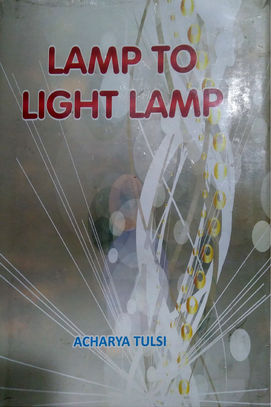There is a group of enlightened and well-to-do young men. They meet together and dream of social development. They make plans to take the country to the peak of progress. But deep within, they have tensions. They feel they are breaking down. They suffer the tragic atmosphere of indiscipline in their families. They are unable to stop children going through the dark labyrinths of addictions. That is why they are sad, although they try to keep smiling. They are dejected -and are looking for some way out that could guarantee a healthy and pleasant life.
Some young workers went to one such group. Considering their circumstances and their mental state they raised certain questions:
Do you desire to live a life without tension?
Do you wish to inculcate good sanskara in your children?
Do you wish to enshrine human values in your families?
I have heard that the enthusiastic workers of the Anuvrat Samiti of Calcutta have started a campaign some time ago. They are contacting enlightened sections of society in the metropolitan city of Calcutta. Like the Rotary and Lions Clubs, they have selected, for the first time, six hundred persons from the highly educated classes, including doctors, engineers, lawyers, judges etc.
The decisive planning of this work has been distributed among the workers according to the number of persons each one would contact. They first make appointments by writing letters to the persons, whom they have to meet. When the appointments are given, they meet them according to their convenience at their respective residences or offices. During the interviews, those people ask—what is your purpose in meeting us? What can we do for you? In reply, the anuvrat workers ask them the above mentioned three questions. If those people show some inclination to reply to those questions and expect help in solving their problems, they continue their meetings. Their aim is to meet and discuss at least ten times in a year.
The workers give to the desirous people introductory literature dealing with anuvrat, prekshadhyan and science of living. They acquaint those persons with these concepts and inspire them to experiment with them in life. They also demonstrate the processes of meditation, relaxation of the body and Anupreksha (therapeutic thinking). Those who experiment with these meditative processes, find relief. The tension resulting from the rat race in urban life, stress pressures and never-ending ambitions are the biggest problems of the modern age. All people, young and old, are affected by them. Therefore, it is not unnatural to be attracted by the effective way that may bring relief from tension.
Television is useful in its own way. But the way in which it is being misused is a matter for concern. It has played a major role in leading to the absence of the sanskaras among children. It has also affected studies of the students. How would the children who spend hours after hours sitting before television, ever have time to study?
There are countless people who are anxious to solve both these types of problems. These problems do have their solutions too. The trouble is that these people do not have a widespread influence. Religious leaders are not free from sectarian considerations. They get so deeply involved in the temple-mosque controversy that what needs to be done is forgotten. They make the mistake of throwing away the seeds of pomegranate and eating the outer cover. Realising that mistake too can be a big achievement.
If all the anuvrat committees in the country undertake some constructive work according to regional expectation, contact the selected persons and inform them in detail about the anuvrat philosophy and its guiding principles and raise these questions before them, then they can find some new direction.
 Acharya Tulsi
Acharya Tulsi
